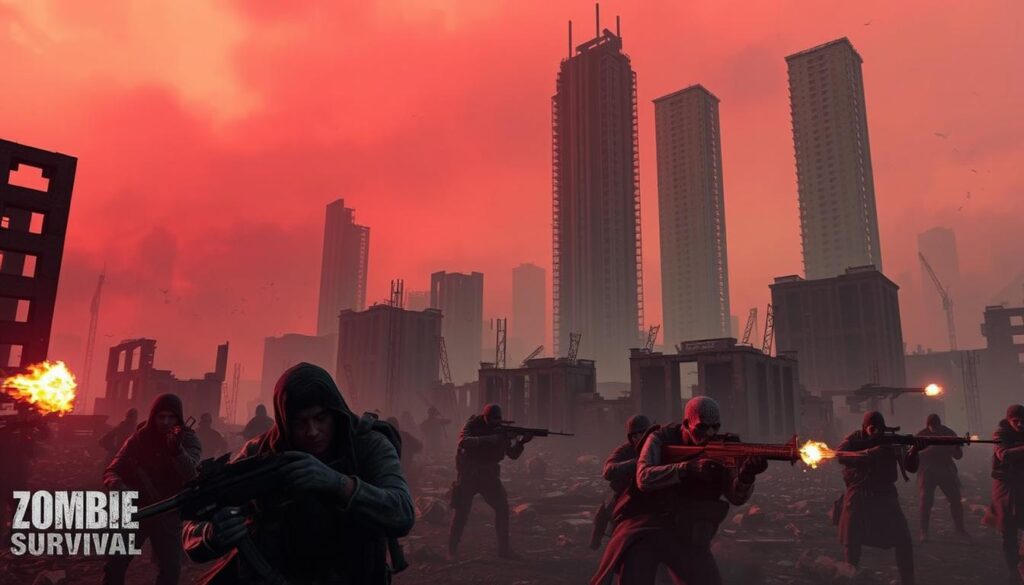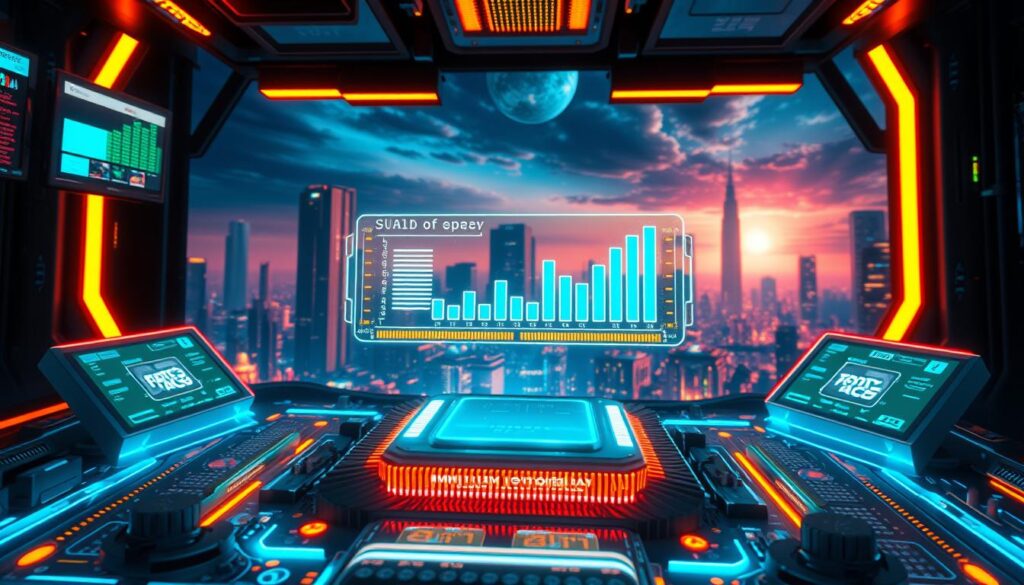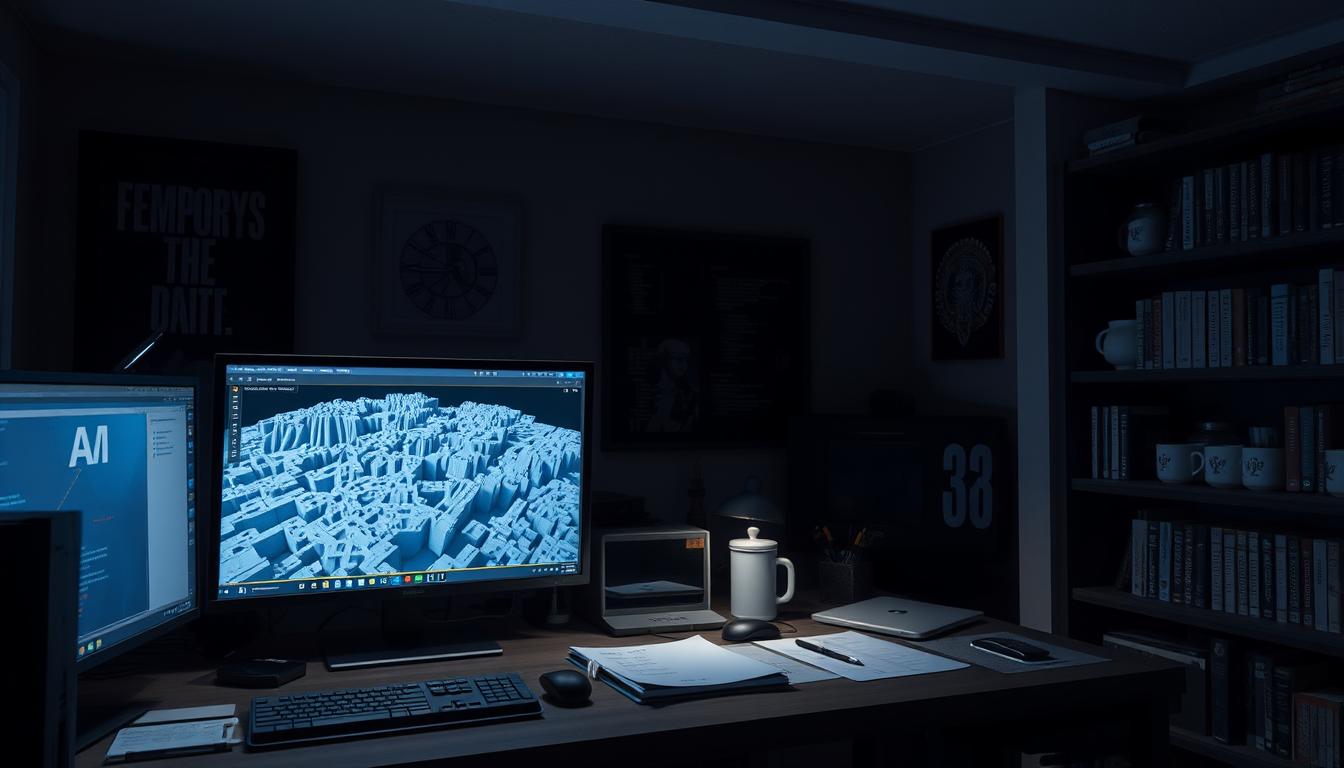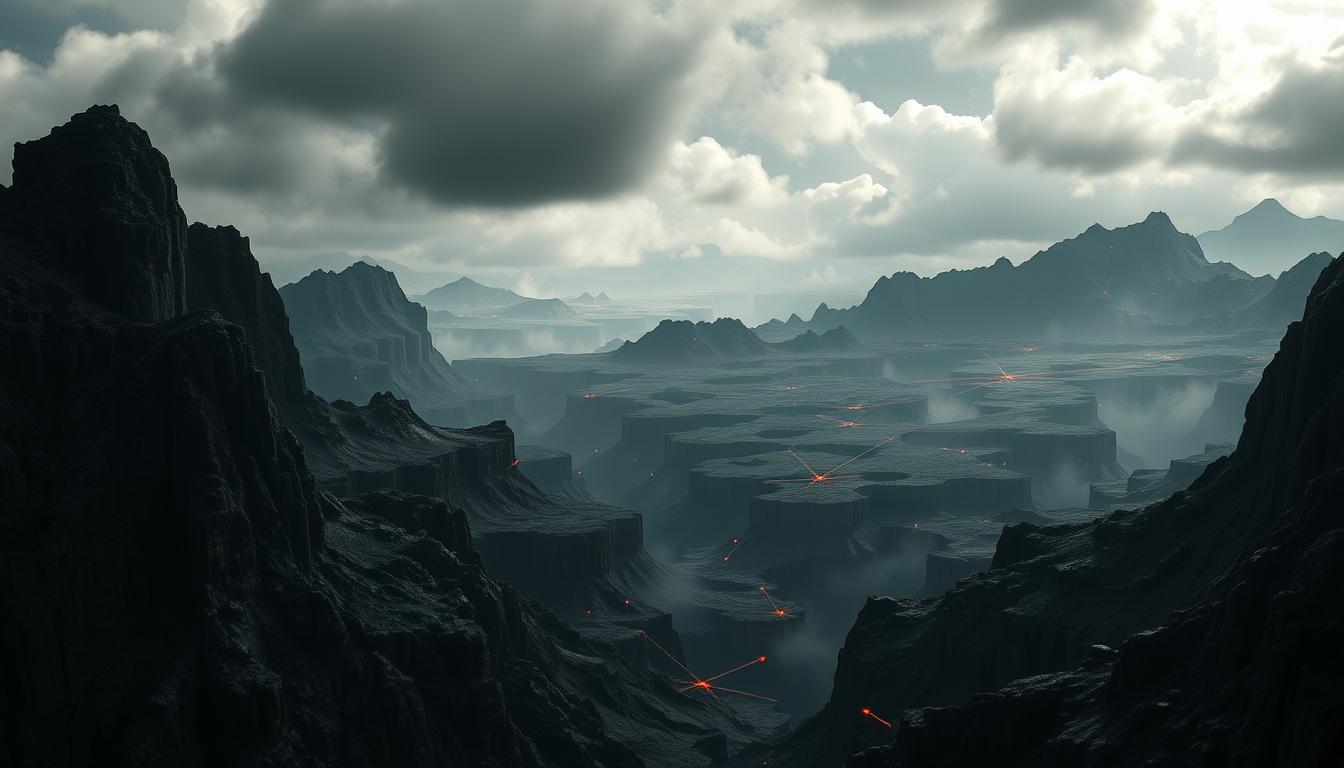Ever thought about boosting your gaming in Zombie Survival: Battle Royale? You can tweak memory allocation to improve your play. Real-time procedural maps add a new layer of challenge, making memory management key to a smooth game.
Let’s explore how certain apps can help with memory management. These tools are crucial for better performance and survival against zombies.
Introduction to Zombie Survival: Battle Royale
Zombie Survival: Battle Royale is a thrilling game that combines survival and combat. It’s available on many platforms. Players must fight off zombies and compete with others in a multiplayer setting.
This game is perfect for both casual and hardcore gamers. It offers a unique mix of strategy and real-time action. This makes it very appealing.
In this game, players use advanced mechanics to beat their opponents. They must survive in a world filled with zombies. The game’s fast pace tests your combat skills and teamwork.

The Importance of Memory Allocation in Gaming
Memory allocation is key in gaming. It affects how well games perform and how stable they are. When memory is managed right, games run smoothly without crashes.
Good memory management means better graphics and faster game response. This makes the gaming experience more enjoyable.
On the other hand, bad memory allocation can cause problems. Players might see lag, stuttering, or even game shutdowns. These issues ruin the fun of playing games.
Developers and gamers need to understand memory allocation. It helps make games run better and look great. By fixing memory issues, games can have more features and bigger worlds.

Understanding Real-Time Procedural Maps
Real-time procedural maps are a big step forward in game design. They make environments that change with how players play. These maps use algorithms for environment generation as the game goes on, giving players new things to see every time.
The process uses complex math to make landscapes. This means developers can create huge worlds without spending too much time on design.
Real-time processing makes sure changes in the game world happen smoothly. This makes the game feel more real. Players might find different terrains, obstacles, and resources, which can change how they play.
This makes the game more fun to play over and over. It keeps players interested because they can see new things every time.
Using procedural maps makes making games easier. It means artists and designers don’t have to make every environment by hand. They can work on other important parts of the game.
This way, developers can make games that are full of variety and interest. It helps players feel more connected to the game.
Key Benefits of Procedural Generation in Zombie Survival
Procedural generation brings big advantages to games like Zombie Survival: Battle Royale. It makes sure the game world is always changing. This means different terrains, enemy spots, and loot can vary each time.
This method makes every playthrough unique. It boosts the game diversity greatly.
Procedural generation also makes the game more fun. Players get to explore and adjust to new situations. This keeps them hooked.
Every time they play, they face new challenges and settings. This makes the game more enjoyable. It also makes players want to play again and again.
Procedural generation makes the game world dynamic. It makes the game better and helps developers save time. They can focus on making the game more exciting for players.
How Memory Allocation Affects Gameplay Performance
Memory allocation is key to how well a game runs, especially in games like Zombie Survival: Battle Royale. Good memory management means smoother gameplay. But, bad management can cause lag and slow down the game.
When memory isn’t managed well, games can freeze or crash. This ruins the fun and can make players quit. Knowing how memory affects games helps developers make them run better.
Using smart memory management can make games run smoothly. It’s about how resources are used in the game. This way, players can enjoy their games without interruptions.
Adjust Memory Allocation in Zombie Survival with Real-Time Procedural Maps
Improving memory use is key for better gameplay in Zombie Survival, especially with real-time maps. Good memory management boosts game speed and makes playing more fun. There are many ways and tools to keep memory use in line with the game’s needs.
Techniques for Optimizing Memory Usage
There are several ways to keep Zombie Survival running smoothly. Object pooling is a top choice, letting assets be reused instead of made new every time. This cuts down on memory use during play.
Memory profiling helps spot and fix memory leaks or waste. Using these methods, both players and developers can enjoy a smoother game. It also reduces memory waste.
Tools Available to Adjust Memory Allocation
Many tools help adjust memory use for better gameplay. Apps like Unity Profiler and Unreal Engine’s Memory Profiler give detailed views of memory use. They help users see and fix memory issues, keeping the game running smoothly.
With these tools, players can get the most out of their game. They also enjoy the changing environments of real-time procedural maps.
Popular Apps for Memory Management in Gaming
In the world of gaming, managing memory well is key for a smooth experience. Many gaming apps help with this by optimizing memory and boosting performance. Players use these tools to keep their games running smoothly, especially in big games like Zombie Survival: Battle Royale.
Here are some top gaming apps for memory management:
- Game Booster: It tweaks device settings to free up memory and boost game performance.
- Razer Cortex: This tool offers a complete package for performance boosts by managing memory well.
- CCleaner: Known for cleaning up files and tracking memory use for better optimization.
- Advanced SystemCare: It’s a one-click solution for managing memory and speeding up gaming apps.
- Memory Booster: It focuses on adjusting memory allocation, offering real-time monitoring and stats.
These apps have gotten great reviews for their memory management skills. They help gamers enjoy their games more by keeping devices running smoothly. With these tools, gamers can cut down on lag and improve their game time.
Comparative Analysis of Apps for Adjusting Memory Allocation
Gaming is getting better, and so is the need for good memory management. Looking at different apps shows which ones are best for gaming. Knowing what each app does well helps gamers get the most out of their games.
Detailed Features of Top Apps
Many apps are great for managing memory. Here’s a table with the main features of the most used ones:
| App Name | Memory Optimization Features | Supported Platforms | Special Features |
|---|---|---|---|
| Greenify | Background process management | Android | Battery saver integration |
| Game Booster | Real-time memory allocation | Android, iOS | Game-specific optimization |
| Clean Master | Memory cleaning and optimization | Android | Junk file removal |
| Razer Cortex | Game optimization tools | Windows | Game launcher and performance tracking |
User Feedback and Performance Evaluation
User reviews are very helpful. Many gamers say these apps really help their games run better. They talk about faster games and less lag.
But, some users mention problems like not working with certain games. All these opinions help people choose the right app for their needs.
Real-Life Examples of Memory Allocation Success in Zombie Survival
Memory allocation success stories in Zombie Survival show how developers and players boost game performance. They focus on making the game better by using memory wisely. These examples show the real benefits of optimizing memory use.
A community-driven mod in Zombie Survival is a great example. Players worked together to improve memory use. This led to better graphics and less lag, making the game smoother.
Players enjoyed faster load times and smooth transitions between scenes. This made the game more enjoyable.
Another example is when the development team updated the game’s memory allocation. They reduced crashes and made the game more stable. Players could play without interruptions, leading to more players sticking with the game.
These examples show how good memory management can make a big difference. Success stories not only celebrate individual achievements but also show the power of teamwork between players and developers.
Challenges Faced in Memory Management for Games
Memory management is a big problem in gaming. It affects both developers and players. Memory leaks happen when a game doesn’t free up unused memory. This can make games slow and hard to play.
Another issue is when developers don’t plan for enough memory. This can lead to games running slowly. Players then face frustrating delays that ruin the fun.
Managing memory gets even harder with new features like real-time maps. These maps need to use resources on the fly. This makes it tough for developers to keep games running smoothly.
Also, games with lots of background tasks can struggle. These tasks can fight for resources, making games slow. Fixing these memory problems is key to a better gaming experience.
Future Trends in Game Memory Optimization
The world of gaming is always changing. New trends are making games more exciting and realistic. Memory optimization is key to making games run smoothly and feel more real.
New tech like machine learning and AI is changing the game. These tools help games use resources better. They make games run faster and feel more alive.
New ways of coding are also helping. Techniques like just-in-time compilation and garbage collection make games smoother. This means better graphics and gameplay for everyone.
These changes are big for both game makers and players. Game makers can create more detailed worlds without slowing down. Players get to enjoy games that are less buggy and more fun.
Expert Tips for Efficient Memory Allocation Management
Managing memory in games is key. Using expert strategies can boost your Zombie Survival: Battle Royale performance. Here are some tips for better memory management:
- Understand Your Hardware: Know your device’s specs. This helps you set up your memory settings right.
- Monitor Background Applications: Close apps you don’t need. This frees up memory for gaming.
- Optimize Game Settings: Adjust graphics and effects to use less memory. But keep the game quality high.
- Regularly Update Your Software: Update your system and game files. This fixes bugs and boosts performance.
Using optimization best practices can make your game better. Adjust settings based on how your game runs. These tips can make Zombie Survival: Battle Royale smoother and more enjoyable.
Conclusion
Exploring memory allocation in Zombie Survival: Battle Royale shows its key role in improving the game. This recap emphasizes the need for both players and developers to manage memory well. Using real-time procedural maps helps optimize hardware resources.
This leads to smoother gameplay, less lag, and more immersion. Throughout this article, we’ve learned about memory management techniques and tools. These insights help improve gaming experiences.
With new technologies and resources, there’s always room for growth. This is true for both gamers and developers. The combination of memory optimization and procedural generation makes games better.
It also shapes future gaming developments. Keeping up with new strategies and tools is crucial. This ensures a fun and challenging gaming journey.
FAQ
What is Zombie Survival: Battle Royale?
Zombie Survival: Battle Royale is a multiplayer game. It combines survival with exciting combat. It has real-time maps and strategic gameplay, appealing to many gamers.
Why is memory allocation important in gaming?
Memory allocation is key for game performance and stability. Poor management can cause lags, crashes, and unresponsive controls. This ruins the gaming experience.
How do real-time procedural maps enhance gameplay?
Real-time procedural maps make each game session unique. They offer diverse environments and enhance replayability. This keeps players engaged without needing much design effort from developers.
What are the key benefits of procedural generation in Zombie Survival games?
Procedural generation adds variety to terrains, enemy placements, and loot. This makes gameplay fresh and unpredictable. It leads to longer play sessions and player satisfaction, saving developers time.
What techniques can be used to optimize memory allocation in gaming?
Object pooling, memory profiling, and monitoring tools can improve memory management. These strategies help manage memory well, leading to smoother gameplay.
Are there recommended tools for memory management in games?
Yes, there are tools like performance optimizers and memory trackers. They help players adjust settings for better gameplay and performance.
What apps are considered the best for adjusting memory allocation?
Apps like GameBoost, Razer Cortex, and Wise Memory Optimizer are popular. They offer memory adjustments and performance boosts based on user feedback.
Can you provide examples of successful memory allocation strategies in Zombie Survival?
Successful strategies involve efficient memory management by developers. Case studies show better performance, like less lag and higher frame rates. This greatly improves user satisfaction during intense gameplay.
What challenges do developers face regarding memory management?
Developers struggle with memory leaks, excessive resource use, and balancing performance with quality. These issues can harm gameplay and player experience.
What are the emerging trends in game memory optimization?
Trends include machine learning for better memory management, cloud optimization, and hardware advancements. These technologies aim to revolutionize memory handling in gaming.
What expert tips can improve memory allocation management?
Experts suggest profiling memory regularly, using efficient coding, and debugging tools. Following these tips can help both players and developers avoid memory issues and improve gameplay.




